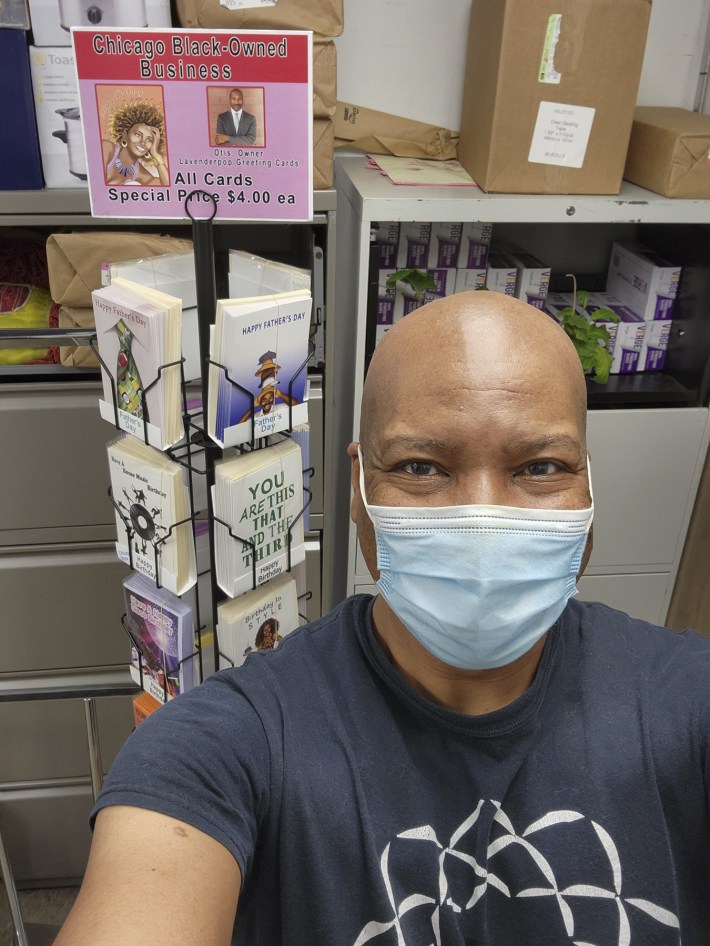WASHINGTON PARK — Otis Richardson never thought he would be in the greeting card business.
The South Carolina native has always had a passion for drawing and painting, but it wasn’t until he traveled to Chicago in the early ’90s, hooked up with a friend, and started to draw an inclusive line of greeting cards that he found his dream and life is calling: Lavender pop Greeting Cardsa range of festive and inclusive cards showcasing and honoring the black community.
One card, “Fade Sistah,” features a black woman with oversized gold hoop earrings, her hair styled and faded to the sides. Another, “LGBTQ Diversity,” celebrates community with people of all identities, ages and hair colors standing in front of a rainbow Pride flag.
Before launching a line of greeting cards, Richardson had never seen cards representing his community, he said. Lavenderpop fills that gap, he said.
“I really want to make a mark in the greeting card market,” Richardson said. “I want to keep expanding to different stores, gift shops, and hospitals. I want to be a place where people can see what I’ve done and help them if it’s something they want to do.
“I never thought of greeting cards as a business”
Richardson graduated from Northern Illinois University with an art degree before moving to Chicago. He “did a lot of freelance work,” he said, painting acrylic on canvas and trying illustration for a living.
In 1999, Richardson and a friend, Hana Anderson, a writer, decided they should try starting a business together, Richardson said. They tossed around some ideas and eventually landed on cards.
“None of us knew the greeting card industry,” Richardson said. “I had made handmade cards for my friends and family, but that was it. But we knew we wanted to do something creative and we wanted to launch a new range of black cards.
Mahogany, Hallmark’s card brand for the black community, dominated the black greeting card space at the time, Richardson said. He and Anderson wanted to create a “younger, hipper version” of the brand and “bring something new to market,” he said.
Blackpop Cards, short for black popular culture, was born. They sold their cards in black bookstores.
“I fell really in love with the process of making greeting cards,” Richardson said. “Before that, I had never thought of greeting cards as a business.”
 Credit: Supplied/Otis Richardson
Credit: Supplied/Otis RichardsonBlackPop ended, but Richardson’s love for making greeting cards never faded, he said.
Richardson decided to branch out in 2004 and tackle art and writing for a greeting card brand called Lavenderpop, he said. The lavender color mixes the pink triangle that gay men were forced to wear in concentration camps with the black triangle that marked lesbians as political prisoners in Nazi Germany, turning them into symbols of LGBTQ pride, according to the human rights campaign.
“I really liked the term and the color lavender. I thought it was unique. Lavender is royal,” Richardson said. “When I started, I had more LGBTQ cards in the collection, and lavender is also considered a popular color in the LGBTQ community.”
When Richardson launched Lavenderpop greeting cards, he wanted to create something he had never seen before, he said.
Richardson had seen holiday cards and black-oriented cards, but he hadn’t seen anything in those collections dedicated to the LGBTQ community, he said.
“When I was going to the North Side in Boystown, I was going to different bookstores and gift shops, and there would be LGBTQ cards, but they would all be white,” Richardson said. “I hadn’t seen any inclusive cards. I decided that I would be the one to create something different that I had never seen in the greeting card market.
Richardson’s Lavenderpop designs prioritized inclusivity, featured lesbian and gay couples in love, and celebrated bisexuality. He sold his cards at gay bookstores and gift shops, he said.
But as online marketplaces like Amazon began to wipe these bookstores off the map, Richardson had to pivot to adapt to the “new retail landscape,” he said.
These days, Lavenderpop’s designs are more focused on “the whole black community,” Richardson said.
Lavenderpop cards feature black faces, which appeal to community members, Richardson said. People want to see their communities represented, even if it’s on a greeting card, he said.
“When you saw yourself in the media, it was very reaffirming. That’s why Ebony and Jet Magazine were such big hits,” Richardson said. and very diverse black characters. These are the ones I find that sell.
 Credit: Supplied/Otis Richardson
Credit: Supplied/Otis Richardson“Success is just around the corner”
Lavenderpop Greeting Cards’ big breakthrough came in 2016 when Richardson became one of the first black sellers to sell his wares in a Whole Foods just opened in Englewood.
Whole Foods officials announced they were closing the Englewood location in April, nearly six years after owners pledged to bring fresh food options to the community. A store spokesperson said the store would be closing “in the coming months”, but did not specify a date.
“It was a big deal getting into Whole Foods in Englewood, and I’m really saddened to hear it’s closing,” Richardson said. “Not just for me, but for people in the community who really leaned into Whole Foods and wanted to have a place to get fresh vegetables and fruit.”
 Credit: Supplied/Otis Richardson
Credit: Supplied/Otis RichardsonWorking with Whole Foods prompted Richardson to try to sell his cards at other grocery stores, he said.
Fans can find Lavenderpop greeting cards at 11 Jewel-Osco stores on the South Side. The Richardson line became the first black-owned independent greeting line to partner with the store in its 100-year history.
Soon, Richardson’s cards will be available at North Side Jewel-Osco stores, he said.
A few weeks ago, Richardson partnered with Local market foods in South Shore, a “huge” achievement, he says.
“One of the things that drives me is a never give up attitude,” Richardson said. “I approached different stores who said ‘No’. The ‘No’ inspired me not to stop. Often success is just around the corner. You just have to stick with it.”
You can buy Lavenderpop greeting cards at these Jewel-Osco stores:
- 7530 S. Stony Island Ave.
- 17705 S. Halsted St. in Homewood
- 3153 W. 183rd Street in Homewood
- 11730 S. Marshfield Ave.
- 1220 S. Ashland Ave.
- 87 W. 87th St.
- 1655 E. 95th St.
- 9400 S. Ashland Ave.
- 6014 S. Cottage Grove Ave.
- 443 E. 34th St.
- 7036 Roosevelt Road at Oak Park
Listen to “It’s Alright: A Block Club Chicago Podcast”:

